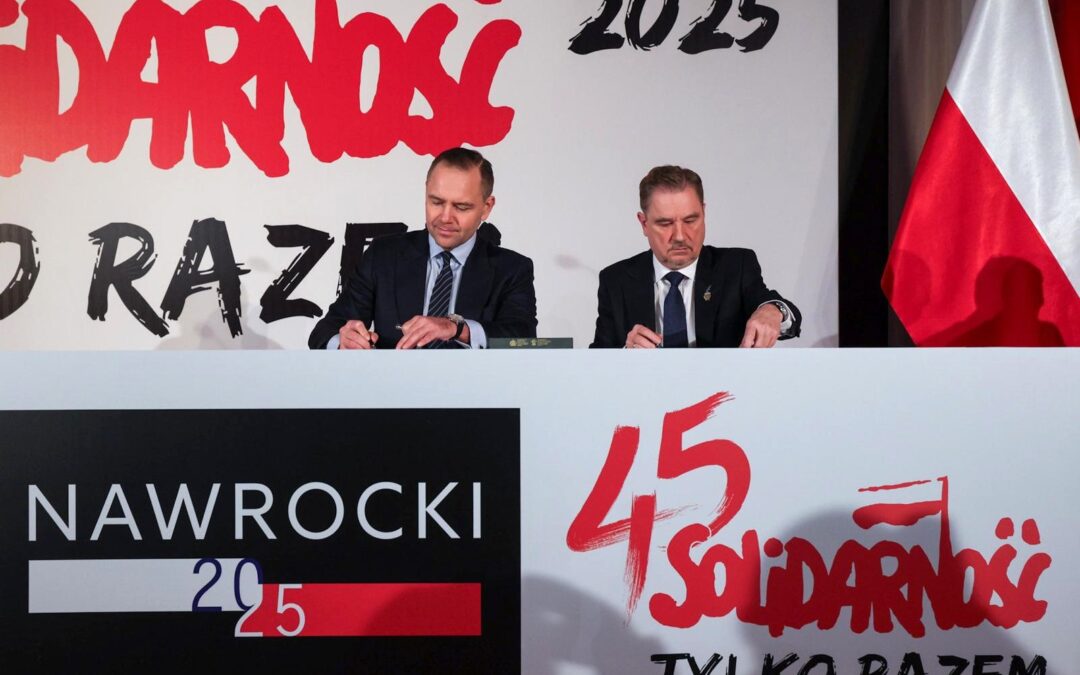Keep our news free from ads and paywalls by making a donation to support our work!

Notes from Poland is run by a small editorial team and is published by an independent, non-profit foundation that is funded through donations from our readers. We cannot do what we do without your support.
Poland’s largest trade union, Solidarity (Solidarność), has endorsed Karol Nawrocki, the candidate supported by conservative opposition party Law and Justice (PiS), in this year’s presidential election
In return, Nawrocki signed an agreement with Solidarity – which famously played a leading role in bringing down communism in Poland – in which he pledged to uphold protections for workers and families, oppose the EU’s climate policies, and respect Christian values.
W historycznej sali BHP Stoczni Gdańskiej podpisano umowę programową pomiędzy Solidarnością a kandydatem na prezydenta RP dr. Karolem Nawrockim. pic.twitter.com/5zSDMuKXbU
— NSZZ Solidarność (@Solidarnosc_) February 13, 2025
At an event in the historic Gdańsk shipyard – the birthplace of Solidarity – the head of the union, Piotr Duda, said that Nawrocki is “the only guarantor that all these postulates” will be implemented and protected.
He promised that Solidarity would encourage its hundreds of thousands of members, their families and all like-minded citizens to vote for Nawrocki at the elections, which take place in May.
Nawrocki himself noted that Solidarity had originally emerged in 1980 in part because “the colonial, communist authorities could not cope with either the Polish economy or the lives of normal Poles…and unfortunately things look very similar in the new circumstances in 2025” under the current government.
The list of 11 pledges signed by Nawrocki includes not raising the retirement age, defending the minimum wage and the Sunday trading ban, promoting economic patriotism, supporting the public health service, and protecting Polish agriculture.
One of the promises is to “limit the negative effects” of the EU’s Green Deal and to seek to hold a “climate referendum”. Solidarity has been prominently involved in protests – in particular by coal miners – against the Green Deal, which it says will harm the Polish economy.
“I guarantee that I will be a defender of the Polish forester, farmer and miner, and until we arrive at the most flexible and stable source of energy – nuclear – I will not allow Polish mines to be destroyed,” said Nawrocki, quoted by the Tygodnik Solidarności newspaper.
Dziś w historycznej sali BHP Stoczni Gdańskiej została podpisana umowa programowa pomiędzy Solidarnością, a kandydatem na Prezydenta RP Karolem Nawrockim. To dla nas wielkie wsparcie i zobowiązanie! Dziękujemy za #SolidarnośćzNawrockim 🇵🇱 #Nawrocki2025 ❤️ pic.twitter.com/TP3N1FxoCq
— #Nawrocki2025 (@Nawrocki25) February 13, 2025
When asked why he was supporting Nawrocki, Duda responded: “Who should we support? Mr Bonjour, who is from the party that raised the retirement age [and] wants to remove crosses from public offices?”
That was a reference to Rafał Trzaskowski, the candidate of the centrist Civic Platform (PO), Poland’s main ruling party. He has been mocked by opponents for his alleged elitism, such as showing of his knowledge of French and other foreign languages.
A previous PO-led government raised Poland’s retirement age (a decision later reversed by PiS when it was in power) and Trzaskowski, who is the mayor of Warsaw, last year issued an order for religious symbols such as Christian crosses not to be displayed in city hall.
Warsaw's mayor has banned the display of religious symbols such as crosses from city hall.
He has also ordered officials to respect the rights of same-sex couples and to use people’s preferred pronouns https://t.co/HekDYSIReu
— Notes from Poland 🇵🇱 (@notesfrompoland) May 16, 2024
During the previous presidential election in 2020, Solidarity also supported the PiS-backed candidate, Andrzej Duda (who is not related to Piotr Duda). He went on to narrowly achieve victory against Trzaskowski.
At its peak in the 1980s, Solidarity had an estimated 10 million members. However, numbers dwindled after the fall of communism, when it became a more traditional trade union. By 2015, it had less than 600,000 members.
Solidarity has often worked closely with PiS, which has a conservative cultural agenda but strongly supports economic and social policies designed to provide generous benefits and protections to workers, families and retirees.
As the Solidarity trade union turns 40, @Jac_Hayden explains how the diverse mass movement that toppled communism has since 1989 morphed into an ally of today’s conservative government, supporting its campaign against "LGBT ideology" and liberal values https://t.co/zpPeJgblsf
— Notes from Poland 🇵🇱 (@notesfrompoland) August 28, 2020
With the support of the influential Catholic church, Solidarity was the initiator of legislation banning trading in most shops on most Sundays. It was introduced in 2017, when PiS was in power, and remains in force.
The current PO-led coalition government, which ranges from left to centre-right, has generally maintained PiS’s popular social policies. However, parts of the coalition, including PO itself, are seen as more friendly towards business and hostile towards workers’ rights than PiS.
Trzaskowski is current leading the polls in Poland’s presidential race, with support of around 35%, ahead of Nawrocki in second on around 25%. If no candidate wins over 50% of the vote in the first round on 18 May, a second-round run-off between the top two candidates will take place on 1 June.

Notes from Poland is run by a small editorial team and published by an independent, non-profit foundation that is funded through donations from our readers. We cannot do what we do without your support.
Source: Nawrocki25/X

Alicja Ptak is deputy editor-in-chief of Notes from Poland and a multimedia journalist. She has written for Clean Energy Wire and The Times, and she hosts her own podcast, The Warsaw Wire, on Poland’s economy and energy sector. She previously worked for Reuters.



















